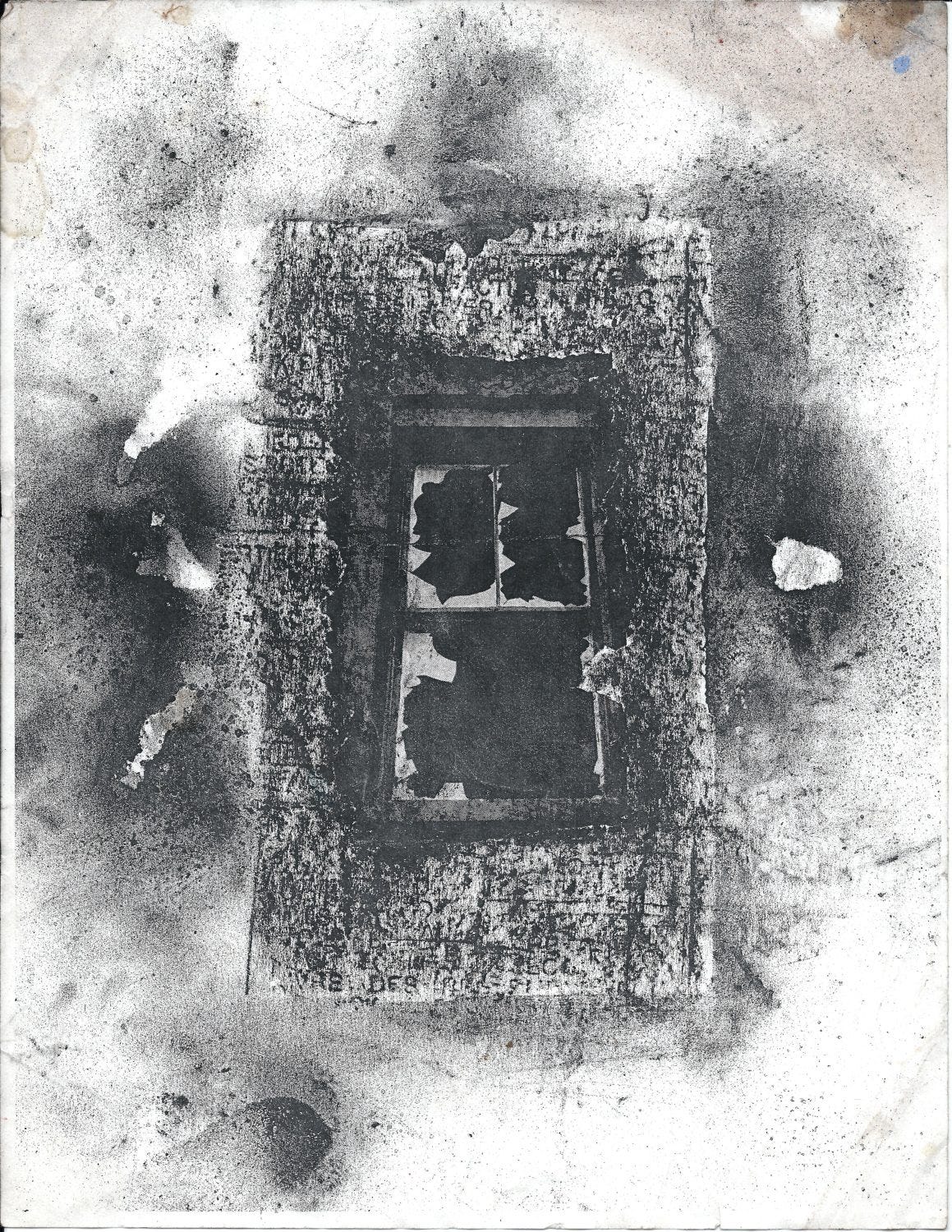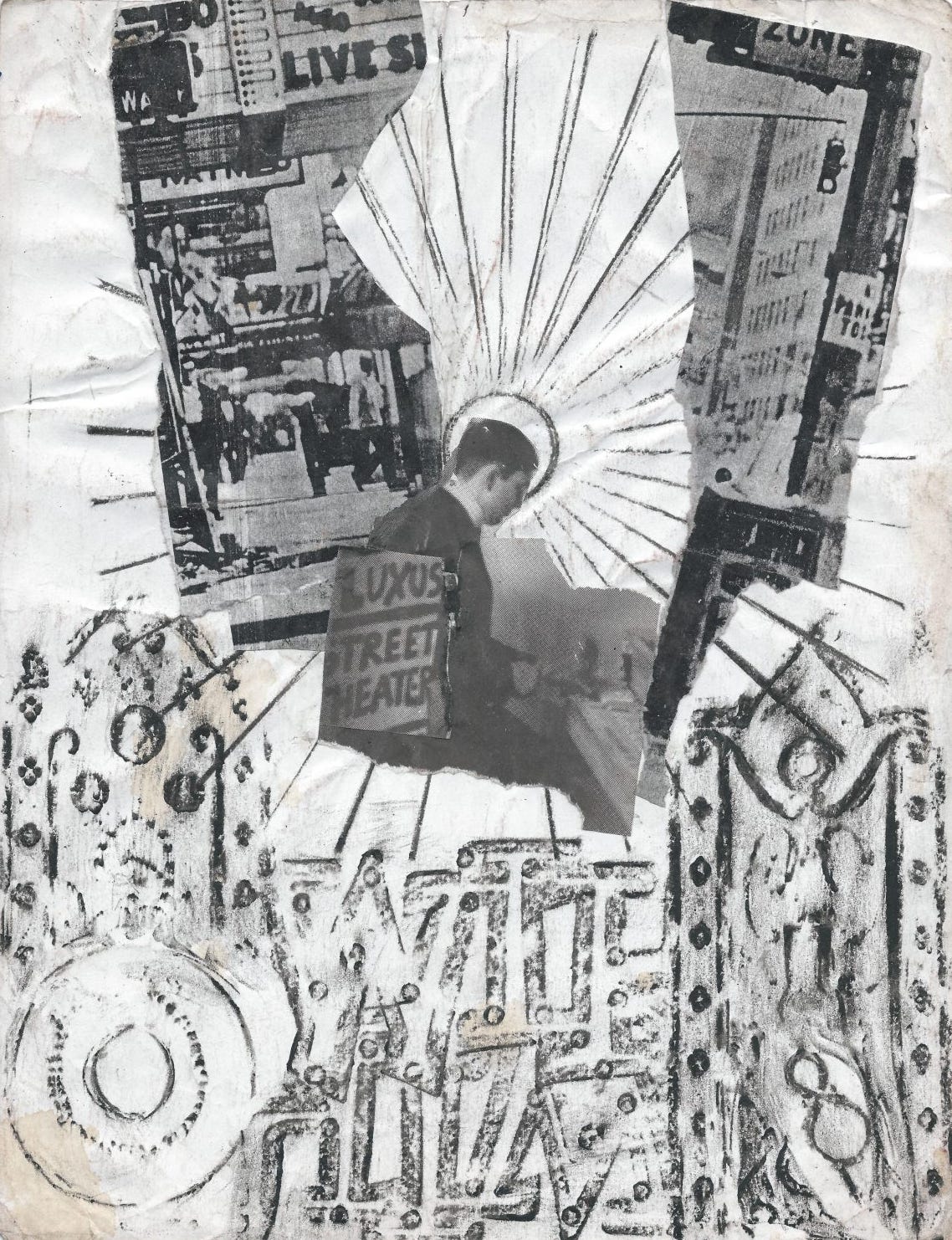All of my interactions with David Baptiste Chirot (b.1953 – d.2021) were through email on various Fluxus, mail art or poetry email groups. Occasionally David sent me some works for exhibitions and for the archives. The three collages shown here are part of the permanent collection.
The following collage poem I constructed from various bits and pieces of Chirot’s writings.
Post-Literateness
For David Baptiste Chirot
I understand regarding his desires
for and in his own work -
working in a balance of each: visual and verbal
being expressed at the highest level
in their collaboration, their balance,
each emphasizing the other.
That one aspect or the other
does not come to dominate,
[When] the visual has tended to occlude the verbal,
the "poetic potential" is diminished.
Unique invention and mathematical formulae:
a sense of balance is important,
each part is carefully worked out:
a degree of rigorous form.
To work out a harmony of the spheres
which combines the poetic and mathematical:
the overwhelmingly stifling of Romantic Inspiration.
The desire for works
to create this particular effect
which tells--(after the fact)
using this method:
to write the poem
to have an immense impact
thoughts on the asemic
a development of [the] highly literate
to move beyond literacy,
a choice: post literate.
Those who desire the post literate.
I have wondered
also about the pre-literate—childhood
"writing" before I learned to read and write.
I have wondered about
a desire for a form and
immediate communication without words.
Make signs which, in their movements,
the thoughts of the notations,
conversation without words,
message without words.
desire for a private language,
meanings, expressiveness without words.
Desire of the very literate to move beyond words
traveling with many concepts of literacy
the traveling of this movement beyond literacy
is to dispense with concepts, to leave them
pinned like beautiful butterflies in a museum.
The abandoning of old.
Observing letterings without knowing what they meant,
what is happening to the letterings themselves,
not the page world,
rather in the actual world,
outdoors written on walls, on doors,
in elevators, on any gadget.
Effects of time, weathering, crashes, demolishings,
fires, storms, bombings, war affecting the wear and tear
of the forms
of letterings and signs [as] visual images painted,
the patinas of rust eating away the paint on old cars
creating changes in the legibility and visibility of signs--
in this I find the journey of language.
This random or planned demolition
smudged, blurred, fragmented, falling apart,
crumbling, rotting, collapsing, smashed,
melted down, burned by fires, smoked and charred,
slowly eaten by erosion, pock marks
of wind blown dust and dirt,
the accumulations of dirt,
the growths of moss and grass.
Ancient and childlike methods,
clay and rubbings,
the materials themselves working,
the paper becomes the meeting place,
a site of encounter,
a collaboration of materials,
actively participating.
They move beyond not only literacy but self
my overall method
the Found
or necessity of invention.
The random plays a part
uncannily meant to be.
Before one's very eyes
found things nobody bothers to notice,
a protest against language about language,
destroying, altering, transgressing.
It becomes "raw", "brut" – a rough encounter,
an asemic non language world.
Forms exposed to the world, in the world
this asemic corrosion,
these asemic convulsions,
from outside,
from the weather,
from wars,
from things being torn down
or thrown away
decaying, rotting, wearing down, charred, damaged.
Interesting poetry is what exposes itself
rather than imposes itself.

A very great deal of poetry art:
visual poetry
sound poetry
all of it are all around one--
around a poetry yet to be found--
a poetry loving painter like Cezanne,
a painting loving poet like Basho,
their injunctions are always to observe nature:
a dirty old alley,
a bunch of junk at one's feet,
a wall with only a few cracks,
a dead spider in a long collapsed and seedy web,
there is the "art of looking".
Poems living lives of their own.
The rain running down the paint,
peeing lettering's fading away on an old barn,
a pasture turned into a cemetery
for cars, trucks, skidoos, tractors and trailers.
Cows eating grass from between the floorboards,
chickens nesting in back seats of old sedans
which smell of afternoons from decades ago.
This heap of rusted smashed up letterings:
metal, plastic, wood, glass,
etched with numbered markers from the factory--
the endlessly interesting lives
of letters, of words, of poems, of colors, forms, sounds--
living with in the actions and effects of time—
just like any other beings on the earth.
This is the most glorious work space,
the most glorious never heard of or before seen.
Poems are laying about there—
Signing, singing and carrying on--
and saying; “Hey you, won’t you join in?”
In a paradoxical way new technologies –
their inevitable fall from ‘Newness”
into obsolescence, collapse, disintegration:
thrown away, hauled off, forgotten, arcane and archaic,
to then be put in a museum.
God help them.
More About David Baptiste Chirot
Remembering David Baptiste Chirot, Milwaukee’s Poète Maudit
There is Nothing but Sunlight and Shadow in the Open Street
Thanks for reading. This is a completely reader-supported publication. If you’d like to support my work, buy my books and/or become a paid subscriber
What do you think? Leave a comment below.






